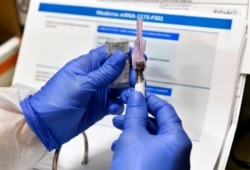Healthcare workers and nursing home residents should be among the first Americans to receive a COVID-19 vaccine, members of a U.S. Centers for Disease Control and Prevention advisory committee determined Tuesday.
The panel voted 13-1 to give a vaccine, as soon as it’s approved, to the some 24 million Americans who are healthcare workers or nursing home residents, while supplies are still limited as production ramps up.
The decision from the CDC’s Advisory Committee for Immunization Practices comes as the U.S. records record numbers of coronavirus cases across the country. The U.S. recorded 4.36 million cases of COVID-19 in November — roughly double the number from a month earlier.
The only dissenting vote was cast by Dr. Helen Talbot, an infectious-disease expert at Vanderbilt University. Dr. Talbot said she objected including nursing home residents in the first group because the vaccine’s safety and efficacy had not been tested in that particular group.
The CDC is also set to revise the current recommended 14-day quarantine period for someone who has been exposed to someone diagnosed with COVID-19. Under the proposed new guidelines, the self-isolation period will be shortened to 10 days, or 7 days if they receive a negative test result.
The state of Florida surpassed 1 million cases Tuesday.
The Trump administration has said that 20 million people could be inoculated by the end of this year.
The FDA is considering an emergency request from Pfizer to authorize the use of its vaccine. Moderna said Monday it also would apply for emergency use authorization of its vaccine.
Hours after Moderna’s announcement, Health and Human Services Secretary Alex Azar said the agency would announce its decision up to a week after it decides on Pfizer’s application.
Dr. Larry Corey of the University of Washington, who leads vaccine clinical trials in the U.S., has said once Pfizer’s and Moderna’s vaccines are approved, they could make 50 million doses in January.
The advisory committee met one day after nearly 139,000 new coronavirus cases and 826 deaths were reported in the U.S., according to Johns Hopkins University.
As it has for months, the U.S continues to lead the world in coronavirus infections, with nearly 13.7 million of the world’s 63.6 million cases. Over 270,000 people have died of COVID-19 in the U.S., more than any other country, according to Johns Hopkins, which reports over 1.4 million deaths worldwide.
In Europe, which is also experiencing surges in coronavirus infections and related deaths, BioNTech and Moderna have applied to the European Union for approval of their vaccines, the EU said on Tuesday. EU officials are expected to decide on at least one of the vaccines by the end of December.
BioNTech has already filed a similar application with the FDA. Its vaccine is under review in Australia, Canada, Japan and other countries.
Since it began nearly a year ago, the coronavirus pandemic has dramatically increased the number of people who are experiencing extreme poverty, according to the United Nations.
The U.N. said in its annual humanitarian report that 235 million people, or one in 33 people, will require basic needs like food, water and sanitation in 2021, a 40% increase from this year.
The report said the greatest need for humanitarian assistance next year is in Afghanistan, Syria, Yemen, the Democratic Republic of Congo and Ethiopia.
The U.N. contributed a record $17 billion in 2020 for humanitarian response worldwide, the report said.






